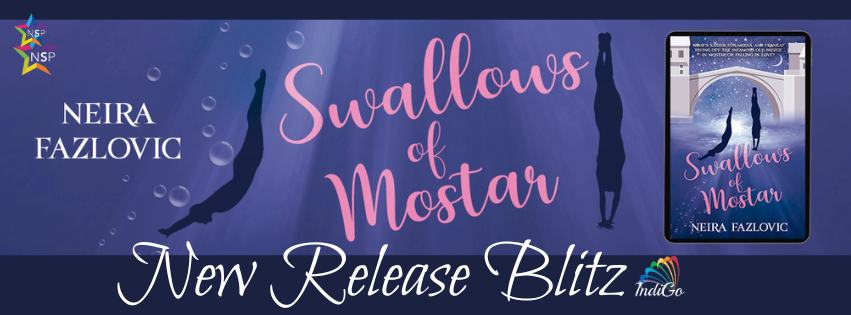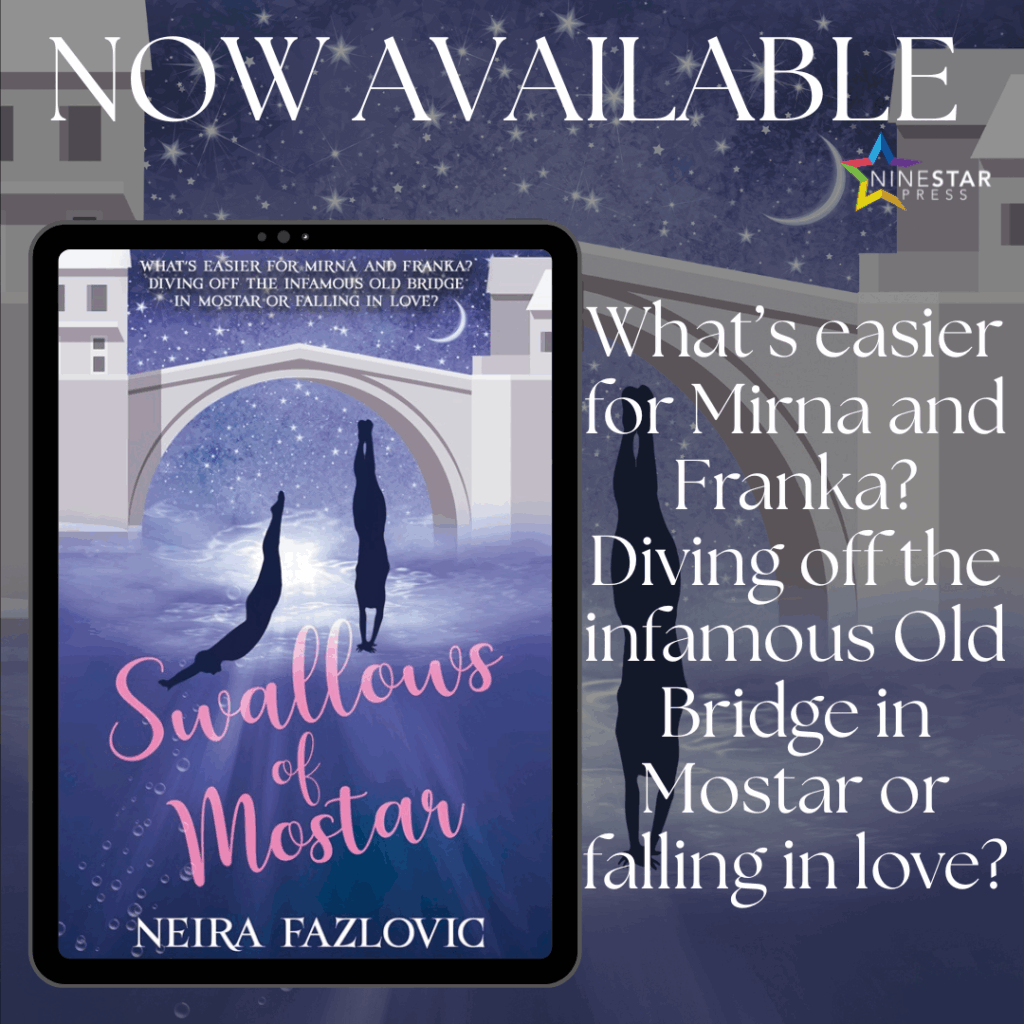Title: Swallows of Mostar
Author: Neira Fazlovic
Publisher: NineStar Press
Release Date: 11/04/2025
Heat Level: 2 - Fade to Black Sex
Pairing: Female/Female
Length: 216
Genre: Contemporary, YA/NA, sports, LGBT, sapphic, Sports romance, cliff diving, summer read, college, contemporary, Bosnia, Herzegovina
Description
Two years after she moved to Mostar, a historic small town in Bosnia and Herzegovina, eighteen-year-old Franka Garcia still struggles with loneliness, language barriers, and terrible grades. After she accidentally falls off the famous Old Bridge, Franka is rescued by Mirna, a wickedly intelligent, but exasperated teenager obsessed with cliff diving.
Despite training all her life and frequently besting her peers, being a girl means Mirna can never participate in the centuries-old tradition of diving off the Old Bridge. But stubborn and determined Mirna won’t give up so easily.
After Franka’s near-perfect accidental dive, Mirna reluctantly takes on the challenge of teaching her all she knows about cliff diving. If Franka and Mirna want to compete, they must enact their unorthodox plan to take down the patriarchal system forbidding them from diving. Falling in love was never part of the plan.
Excerpt
Swallows of Mostar
Neira Fazlovic © 2025
All Rights Reserved
Čudna jada od Mosta grada
The morning sun was warm against Franka’s skin, and the pleasant summer wind ruffled her hair. Her lungs eagerly took in the first wisps of fresh air after weeks of being stuck inside with nothing but textbooks and math equations to keep her company. She leaned against the cold, stone wall of the ancient street that led to the Old Bridge, as the sweet and nutty taste of her ice cream caused her brain to produce some much-needed serotonin. With the River Neretva carrying away her worries, Franka looked up at the bright sun and smiled for the first time in weeks.
The scene in front of her was a common sight in this part of Mostar. The lanky guide was probably barely out of high school, with a subtle Slavic accent in his English and a vocabulary that could use a bit more work. Still, his flock of tourists (Canadian retirees, if Franka was correct) seemed interested in what he had to say about the city of Mostar, the often overlooked jewel of Southern Europe, as he called it, even if they probably could have read most of his speech on Wikipedia. Today, Franka didn’t mind because, only moments ago, a miracle happened: after two years of living in this city, she finally effortlessly understood a single sentence of the language.
The sentence was uttered, or to be more precise, yelled, through a thick accent by a tall young woman in a traditional Bosnian costume who sold trinkets to the tourists at the store closest to the Old Bridge. To be perfectly honest, the sentence wasn’t overly complex, but it was more than a hello or a plea to buy some souvenirs Franka would have recognized even before she was so cruelly punished by the gods and forced to live in Mostar. It wasn’t even directed to Franka or any other tourist, but to Ado, a short young man (at least, short for the land of giants that was Bosnia and Herzegovina) who was now running past Franka in only his bikini bathing suit, sporting a very smug grin on his youthful face. The sentence was simple, but it might as well have been poetry to Franka. “Ado, idiote, ne naginji se na ogradu, neki kreten ju je jučer razvalio!”
Some jerk busted the fence yesterday, and Ado was a fool for leaning against it. What a lovely statement!
Croatian was needlessly complicated, in Franka’s humble American opinion. So was Bosnian. And Serbian. Mostly because they were the same language with a few subtle differences, no matter what the native speakers would like to argue. Declinations, verb changes, and grammar cases, not to mention genders were all entirely unnecessary. Who decided “river” was female and “bridge” was male, and can their descendants pay for making Franka’s life in the city of Mostar somehow even more miserable?
But on this sunny summer morning, as she made her way to the Old Bridge, Franka at least got this one sentence correct. Maybe Mom was right. She really needed to leave the house.
*
“Franka, I just heard from a reputable source that it is summer outside. Can you believe it?” Mom had announced last night. She had walked into Franka’s, what could in the most generous terms be called “room,” without knocking and skipped over a pile of textbooks on the floor.
Franka sat behind her desk, a few days away from being completely taken over by the chaos that spread far and wide. Math, chemistry, and physics textbooks covered most of the available surfaces, other than the bed with messy covers that were probably supposed to be changed a few weeks ago. The seemingly endless quantity of mugs and bowls of cereal that kept appearing, but never disappearing, were very close to developing their own civilizations in this hot and moist environment. Franka didn’t have time to care. She had more important things to worry about.
She had finished studying chemistry for today (the urea cycle) and turned to math practice, littering her desk with scraps of paper filled with math formulas she understood perfectly. In English. Croatian was a different story.
“Really?” she asked, not even looking up at her mom, checking her result in the back of the textbook instead. It was correct, as was every single result she’d gotten for days had been. “I haven’t noticed,” she added in Croatian when she remembered this was her “no English summer.”
“Go out, please,” Mom said, switching back to English. “I beg of you. You have been in this house for a month! You will pass your exam.”
“I thought so last time, but here we are now!” Franka said. She was so lucky Bosnian colleges worked differently than the American ones, giving her an opportunity to retake her entrance exam in September and actually get in. The whole schooling system was unlike the one she was used to, where specialized colleges for pharmacology (as well as anything else) allowed her to skip undergrad studies and become a pharmacologist in just five short years. That was, if she could pass her exam.
“You have been stuck in this filth since June! That’s not healthy,” Mom continued, looking around as Franka suddenly became aware of the mess, the faint smell of stale air, and the boxes of stuff she should have unpacked two years ago. Still, she shook her head “no” and picked another math problem to focus on instead.
“Neither is not getting into college,” she said and tried to get back to her linear systems with two variables. Every list of questions from previous entrance exams for the Faculty of Pharmacy at the University of Mostar had at least one of those. If she wanted in, she had to be proficient, so god help her! “Very bad for the thyroid gland.”
“So, you want to cram two years’ worth of studying that you didn’t do into two months?” Mom asked, perfectly aware Franka might pull it off by any means necessary.
“That’s the plan,” Franka said and turned back to her math problem, but Mom wasn’t quitting.
“Go out. Please,” she begged again, but Franka wasn’t listening. “One hour?” she asked. “Can’t you spare one hour, so I don’t think you are losing your mind with all that science? One hour and you can get me off your back for at least a week.”
Franka paused for a moment. She was wasting time arguing right now, as she did for the past few days. It probably added up to an hour or so in total. Maybe this was the solution.
“You are in one of the most popular travel destinations in Eastern Europe. Enjoy it for an hour,” Mom continued. “Pretend to be a tourist. Grab some ice cream. Please. Mostar is a beautiful city. I promise you.”
“Very overrated,” Franka scoffed. When she was a kid, Franka had loved coming to Mostar for a few weeks every few years. Then she would go back home to Atlanta and tell her friends she went all the way to Europe and to this small country called Bosnia and Herzegovina in the Balkan Peninsula where her mom was born. Now that she was stuck here, it was hell. The city didn’t change, but everything else did. Mostar was a picturesque town, filled with history, world-famous for the sixteenth century Old Bridge that connected both sides over the gorgeous River Neretva that divided them. It was also too hot, too touristy, and too small (both in its size and the mentality of its people).
“Because our suburban hellhole in Atlanta was so much more fun,” Mom said, making Franka frown. If nothing else, Mostar was a living, breathing, organic city, even if half of the buildings were destroyed in the War and never fixed.
“I have to study. I don’t have time to mess around,” she continued. Tomorrow was the time to tackle the Krebs cycle again. Last time she lost at least ten points on that question. She knew it in English, but when she tried to explain it in Croatian, panic took the wheel of her brain and drove them both straight into a ditch.
“You want to practice the language? Go out, talk to an actual Herzegovinian other than me! It will do you wonders,” Mom continued, closing the textbook right in front of her.
That was the second argument that had given Franka pause. Coming to Mostar with barely any knowledge of the language despite her mom being born and raised here and then going to a school that was in English for two years really didn’t make any of this easier. Every time she thought she had the hang of it, someone would drop a new slang word or speak too fast and she would get lost again, so it was easier not to try at all.
“And you know, Isabella would love a selfie from the bridge. You know she loves bridges,” Mom added in her sweetest voice because she knew bringing up Aunt Bella would work.
And it did.
Purchase
Meet the Author
Neira Fazlovic is a writer of books about lesbians, ghosts and science. Veterinarian by trade (and soon to be a PhD), she has been writing since she was thirteen. She is a great fan of cats, typos and Bosnia and Herzegovina.



No comments:
Post a Comment
I try to get comments published as quickly as possible. I don't always reply to comments on my blog, but I do try to visit as many people as possible when I participate in blog hops and I share links where possible to Twitter, Facebook, Pinterest, and such so others can discover your work. I do read and appreciate your comments.